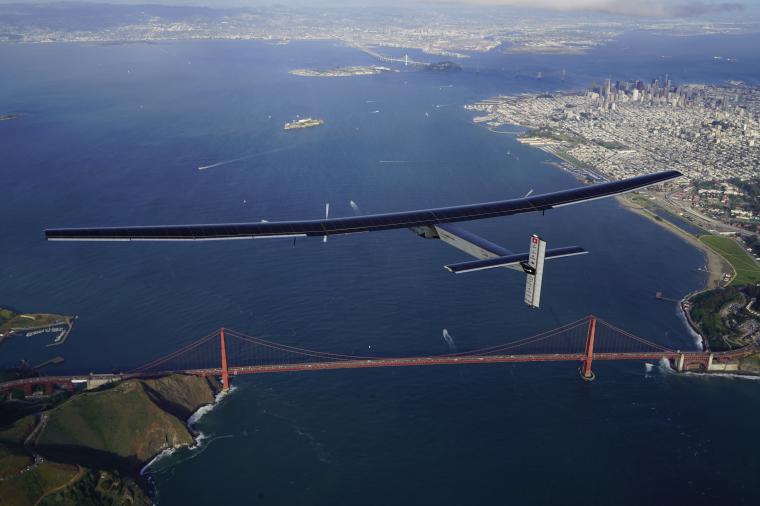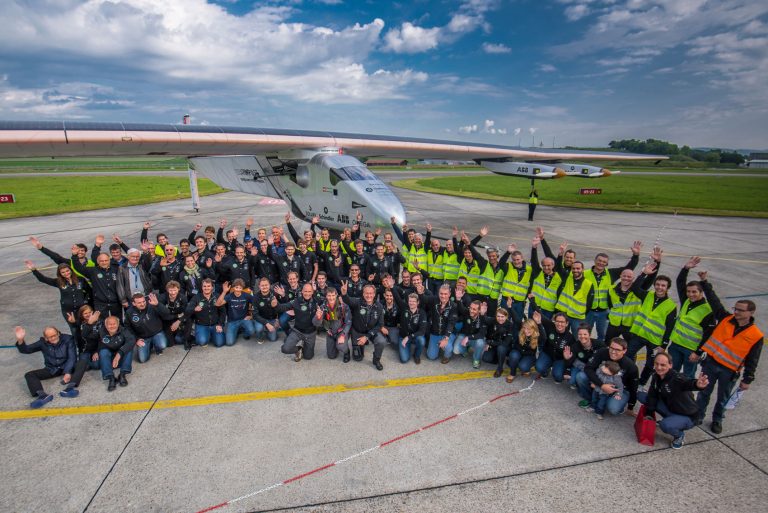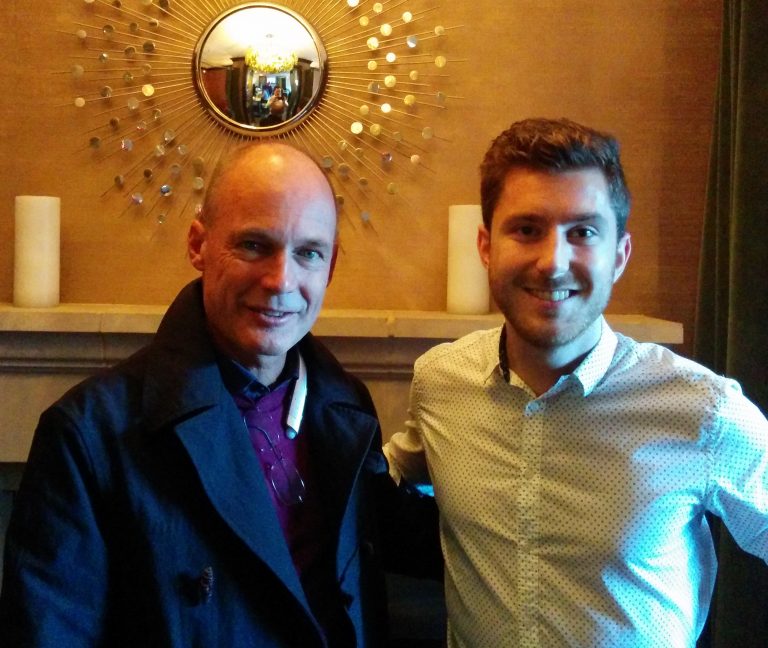July 26, 2016 will remain a landmark date in the history of aviation and renewable energy. It was the day the Solar Impulse plane landed in Abu Dhabi, completing the first round-the-world flight without a single drop of fuel.
Imagine a plane with a wingspan of over 70 meters, wings entirely covered in photovoltaic panels, and weighing less than 2,500 kilos. It took fifteen years to make this completely crazy project a reality. Two Swiss men are behind this adventure: Bertrand Piccard and André Borschberg.
As part of Civil Aviation Week, the Chamber of Commerce of Metropolitan Montreal invited Doctor Piccard to give a lecture on October 3. Since my little sister is part of the Solar Impulse team, I had the privilege of being able to experience the adventure from the inside, holding my breath during the perilous ocean crossings. I took advantage of this Swiss pioneer’s visit to Montreal to ask him a few questions about his notion of leadership and his personal brand. And for good reason, not everyone can get $170 million in funding, especially for a crazy idea.
Meeting with one of the greatest explorers of our time.
Renaud Margairaz: Launching a project of this magnitude requires the support of many partners. For this, rational arguments are not always enough. What role does the personality of the project leader play in such an exercise?
Bertrand Piccard: Personality plays a vital role, especially at the beginning, when the project is not credible because we have nothing to show. There is the personality of the person who is going to ask for money but also that of the person who is going to give. Two pioneers must meet, they must want to achieve something together that is considered impossible. With this in mind, we already eliminate a large number of people, those who unfortunately remain stuck in their habits and their fear of risk. During my project, I didn’t try to convince my partners. When you convince, you fight against the part of the other that wants to say no. What I did was motivate them. When you motivate someone, you support the part of the other that wants to say yes. It’s something else entirely.
“Explaining how is management; explaining why is leadership.” [Heard at Bertrand Piccard’s conference]
The Solar Impulse aircraft overlooking San Francisco Bay
I didn’t ask them to pay to finance my dream. It wasn’t sponsorship, it was partnership. I focused on honesty and transparency by telling them: “I can’t guarantee that it will succeed, but I can guarantee that we will try together.”
I told them that this project would also belong to them and we involved them in decision-making throughout the adventure. The big sponsorship specialists decided not to get involved because of the lack of predictability of the possible outcomes.
On the other hand, those who saw this project as an opportunity to innovate came. These companies of course gained great visibility, but not only that. The real value lay in the internal stimulation and all the product innovations that resulted from their involvement and which opened up new possibilities for them in terms of marketing.
“It was not the candle makers who invented the electric light bulb.” [Heard during Bertrand Piccard’s conference]
The great Solar Impulse team
Renaud Margairaz: Throughout your career, have you managed your personal brand in a rational and conscious way with a clear objective in mind, or have you simply followed your intuition and carried out the projects that were closest to your heart?
Bertrand Piccard: I don’t feel like I managed my brand. I rather feel like I expressed what suits me and what I believe in. It’s been like that for three generations, with my grandfather (Auguste Piccard) and my father (Jacques Piccard) before me. It has always been about scientific adventure with the aim of protecting the environment. There is a constant that has thus been established, a credibility.
During my various adventures, I didn’t say to myself: “I have to take this profile to develop a brand. “Sometimes, on the contrary, I said what I wanted to say, I did what I wanted to do, even if it wasn’t the easiest thing to develop my fame.
I always got across the message I wanted to convey before the image. There are some people who don’t understand that and who say: “A scientist who starts talking about philosophy, that’s not normal.”
During my childhood, I was very marked by all the famous people I met who didn’t say anything useful. They didn’t use their celebrity to get a message across. I always said to myself: “The day I’m famous and I have microphones in front of me, it won’t be to say nothing, it will be to say what I think.”
It would probably have been easier to say that I do what I do for the sole purpose of breaking a world record rather than getting a philosophical or societal message across. If I decided to create Solar Impulse, it is to show that clean technologies can achieve the impossible. This concerns the field of civil air transport but also all other sectors that represent a threat to the environment. For me, celebrity is a means of having a media, institutional and political impact in this sense. It is not an end in itself.
Renaud Margairaz: The Solar Impulse project is a project with two faces. On one side André Borschberg, fighter pilot and engineer, on the other Bertrand Piccard, psychiatrist and explorer. Your collaboration has enabled the success of Solar Impulse. However, does the combination of two very different personal brands also represent a strength when it comes to supporting the same project?
Bertrand Piccard: In our project, we have to be as precise with words as with the calculations of the resistance of the structure or the electrical efficiency of the aircraft. If an error occurs in the choice of terms used, people risk misunderstanding what we are doing. For this, I was always there to validate our communications and ensure that the words were always well chosen. Having two very different people supporting the same project can sometimes be a challenge. To maintain a balance between us, we had to level down several times. Sometimes, I could have communicated things that would have unbalanced the relationship with André, and I didn’t. For communicating a project, it is not a strength to be two. On the other hand, to succeed in the project it is an undeniable advantage. The creativity necessary for the success of such an adventure existed because we were different from each other.






